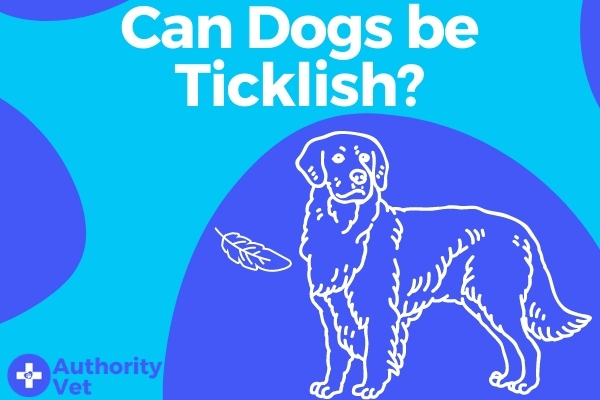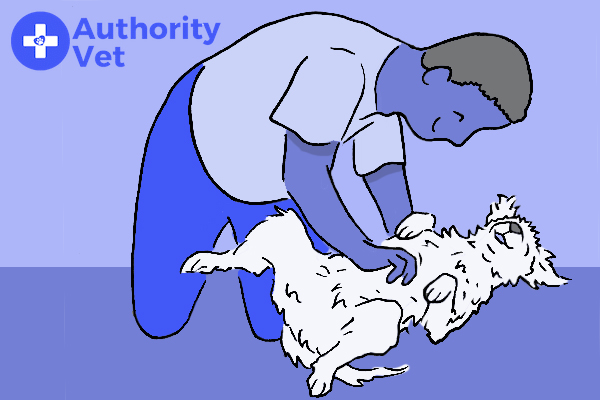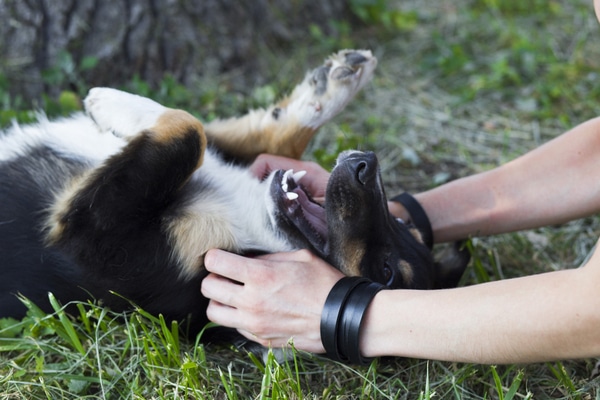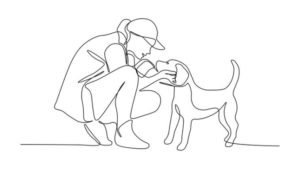Dogs can be ticklish based on your definition of what tickling is! A tickle causes an involuntary movement in response to a stimulus, such as when you scratch your pet.
Like humans, dogs have certain spots on their body that they prefer to be touched and scratched. Common areas your dog may respond to include their stomach, base of their tail, neck, and their chest, right between their front legs.
When you scratch your pet in these areas, you may notice that their foot begins to kick, they lick at the air, and may even grin. Their response is known as a "scratch reflex," an involuntary reaction to a stimulus such as an irritant.
When the area is stimulated, it activates the nerves located under the skin, which are connected to the pet's central nervous system, and the muscles contract, causing your dog to react.
A scratch reflex is an automatic form of protection that alerts your pet to irritants on the skin.

If your dog has a neurological issue, they may not respond to you tickling or scratching them. Oftentimes, your Veterinarian will use this technique to diagnose nerve damage or neurological trauma.
Just like with humans, dogs may not always find being tickled enjoyable. It is still best to keep in mind your dog's body language to ensure they are enjoying you touching them in a certain way.
Body Language to Watch Out For:
While tickling or scratching may be enjoyable for a short time, it is essential to be mindful that the nerves can become overstimulated. So, be wary of your dog's behavior to ensure you are not causing them any undue stress.
If your dog becomes stressed after a tickling or scratching session, consider reducing their anxiety by giving them ample space to relax and reset.
If your dog becomes anxious from being overstimulated, you can help them calm down by:

While dogs cannot laugh as humans can, they can exhibit their happiness by opening their mouths, revealing their tongue, and stretching their mouth from ear to ear. These mannerisms are often seen when dogs play together or when they come in contact with one of their favorite humans.

If you feel your dog is incredibly ticklish, overly sensitive when being touched, or is reacting negatively, it could be a sign of an underlying issue.
Though your dog may be primarily indoors, if not treated monthly for fleas, they could be overly sensitive to being tickled or scratched. Dogs who are allergic to fleas will only need one bite to be sent into a scratching frenzy.
Just like with people, dogs are susceptible to allergies. Skin allergies can cause moist or dry skin and red patches that can be sensitive to touch. Some dogs may have seasonal skin allergies, or it may be a year-round issue that your veterinarian needs to address.
Dry skin is a common occurrence in the winter month for both people and pets. Scratching dry skin may lead to a skin infection. A soothing shampoo, like one that contains oatmeal, may help to soothe your dog's skin.
Your dog will let you know if they do not like the extra attention, usually by getting up and running away.

Nicole is a Licensed and Registered Veterinary Technician in Washington and California. She is the immediate past president of the Washington State Association of Veterinary Technicians and holds multiple advanced degrees in veterinary technology, psychology, and human health care management. She has worked in private and corporate settings. Nicole manages an ambulatory surgery practice based in the Puget Sound area of Washington. When not working in the clinic, Nicole is a frequent lecturer at various national and international conferences and meetings. She is also a tireless advocate for the appropriate use of regenerative therapies in veterinary medicine.
